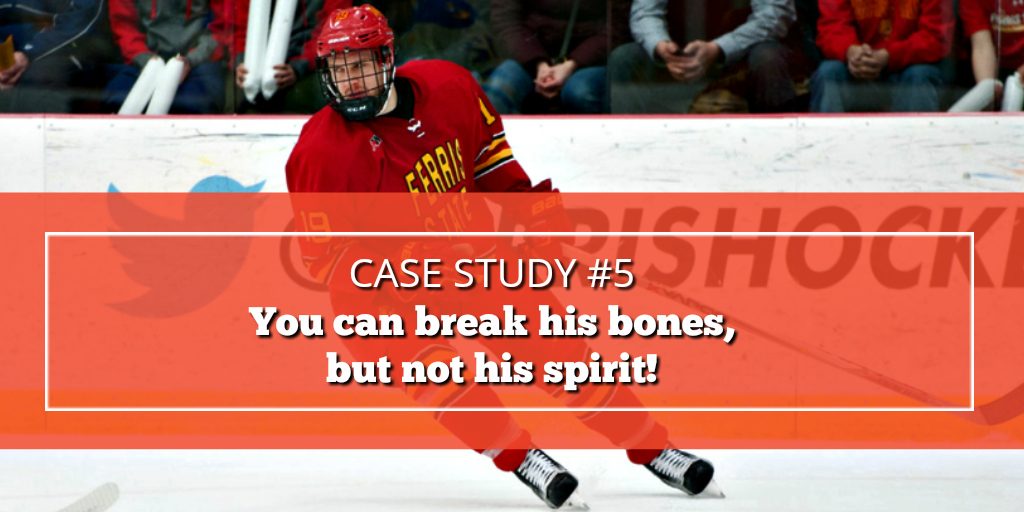“Where is the fun in life if there is no challenge?” Andrew Mayer
No words ring more true than for Division 1 hockey player, Andrew Mayer. The Ferris State University senior’s middle name should be GRIT! His dad is a former professional hockey player with the Pittsburgh Penguins and his mom played division 1 volleyball. Throughout his hockey career, Andrew has broken more than twenty bones and has had six surgeries but has never lost his determination or will to play the sport he loves. This is his story …
1. When did you start playing hockey and at what level? I started skating at age 6 and started playing hockey at age 9. AAA travel levels in youth, Junior A hockey and I currently play D1 collegiate hockey.
3. What has been the toughest challenge you’ve faced playing sports? I’ve had a ton of adversity in my life and I’m ready for more to come. Where is the fun if it’s not a challenge? The toughest time so far was when I was 19 years old. I was in the best shape of my life and I was the captain of my high school team. It was my senior year and my only goal was to defend our National Championship and earn a Division 1 scholarship. In the first game of the season, I was hit from behind and broke my radius arm bone in half. I was told I might not play hockey again. The doctor told me I couldn’t play that season. My goals were starting to sound impossible. I got the surgery as soon as I could, 1 large
4. What advice would you give young athletes who are dealing with serious injuries? The advice I would give to young athletes battling injury is to always stay busy. If you cannot be physically active, stay mentally active. School is the most important thing growing up and if you do well in school it will lead to great opportunities in college sports and well beyond. If you get knocked down, fight harder to get back up every time.
7. Have you ever experienced burnout? Burnout, hmmmm. Probably right now. I feel burnt out because it’s my senior year and I am currently injured again. I had a surgery this season and I just injured myself again.
8. What is it like to play D1 college hockey? What is the best part and the hardest part? It is a blessing. I’d like to thank God, my lord and savior for allowing me this opportunity to play at FSU and my family for always being there for me. Perks are that you get to compete day in and day out. Also being able to meet a lot of cool, respectful, new people on a daily basis. I also love putting that sweater on and representing that crest on the front of that hockey jersey.
10. What are your future goals? I wanted to play in the NHL, but can’t now because of all of my injuries. So, my goals have changed. I want to get a job in sales, one that I love! And to have a family.
11. Was it difficult to give up your dream of playing in the NHL? Yes, however, I know that there are great opportunities ahead of me after I graduate. You have to set goals in life and sometimes those goals change. I want to coach my children or coach hockey teams because I love seeing people evolve at something they love. Hockey is a great game, however I can’t revolve my life around it. I want to be as great of a father as my father was to me. He gave up his dream of playing professional hockey to start a family and coach my sister and me. That is motivation for me to do the exact same thing in my years to come! I want to make enough money to raise a healthy family and I want to be able to love my wife and kids as much as my parents did.
12. What advice do you have for athletes who don’t make it to the next level, whatever that may be? To access their skills within that sport that they can no longer play COMPETITIVELY and use them in other aspects of life to succeed. For example, I am going to use my leadership skills that I acquired after being a captain and a leader on the ice in the business world someday. Sports are a great foundation for real life. And two things I live by, building relationships and always following up.
